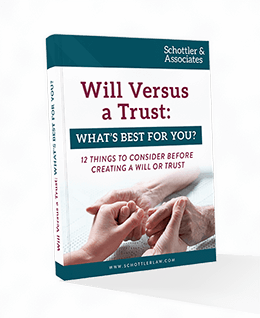Probate Services in the Chicagoland Area
Ensure that your loved ones receive the inheritance they deserve and that your values are protected.
Get the Legal Assistance
That Probate Requires
Mark Schottler has been practicing law since 1996 and has extensive experience in the area of probate.
He is a graduate of the JD/MBA program at Marquette University, earning both a law degree from the Law School and an MBA from the Graduate School of Management.
Mark Schottler is dedicated to helping you make the right decisions when creating a will or trust to ensure your values are protected and your loved ones are taken care of.
He is currently licensed to practice law in Illinois and provides legal help to the Chicagoland area.
Free Download:
WILL VS. A TRUST: WHAT’S BEST FOR YOU?

That is why we have put together a free guide giving you the 12 Things to Consider Before Creating a Will or Trust.
This guide will help you understand the concerns you have about setting up an estate plan, and will guide you towards the right option for your situation. There are several things to consider, and we lay out when a will is helpful vs. a trust.
You deserve to have all the facts so that you can make an informed decision. Let our experience help you in gathering the information needed before making any decisions that affect your future.
Probate
We provide professional legal assistance to understand the instructions and documentation you need to put into place to satisfy the court, appease creditors, and successfully ensure your assets go to the family members or friends in the way you intend them to.
At Schottler & Associates, we can help you ensure that your intentions are clear so that when your valuables need to be divided, your values remain protected. We can help you identify your needs so that you can put the best measures in place.
Wills
Believe it or not, 40% of Americans over the age of 45 don’t have a will, and the reasons most often cited are: feeling they didn’t need one (17%), feeling it’s not an urgent task (22%), and never finding the time to make one (57%). Yet incapacitation and death are unpredictable.
Having a living will and last will and testament in place not only remove ambiguity and avoid unnecessary complications, but it will avoid laying an undue burden on your loved ones while ensuring that the right people are in control of or receive the correct parts of your assets.
Trusts
Estate planning is an important step in protecting your family should you be incapacitated or die, and a key option for that plan may be a trust. Unlike a will, your trust actively survives your death, guided by the successor trustee so that all trust property is delivered as laid out. Most importantly, property held in living trust avoids the probate process. Schottler & Associates can help those in the Chicagoland area set up a trust for the future.
Land Trusts
Like all trusts, a land trust is an agreement by which the managing beneficiary directs the trustee in how to handle the benefits of that trust (in this case, real estate). While the managing beneficiary remains the liable party in land trusts, the deed which conveys the property to the trust doesn’t identify any of the parties involved; only the beneficial interest is assigned. We’ll help you negotiate and manage a land trust.
Frequently Asked Questions About Probate
What happens during Probate?
The probate process begins when the executor of the estate submits the appropriate paperwork to enter the will into probate and officially assign the executor. The court will determine whether or not the will is valid; this is usually routine, but sometimes a will may be contested. All the decedent’s assets are identified and appraised before the proceedings continue. Eventually, the assets are distributed according to the will.
How Are Debts, Expenses, and Taxes Paid?
Expenses, such as funeral costs, estate taxes, and valid debts are paid for out of the estate. The estate itself is considered a tax paying entity, which means it’s assigned a taxpayer ID separate from the decedent to file reports about income and deductions. Estates over $4 million will have to file a Illinois estate tax return.
Does All Property Go Through Probate Court?
No — estates that are valued under $100,000 and do not contain real estate are allowed to submit simple affidavits in lieu of a formal probate proceeding. Furthermore, property that is jointly owned and assets owned in joint tenancy is not subject to probate. Accounts that already have a beneficiary listed, such as payable-on-death or retirement accounts, are distributed to those beneficiaries without probate. And assets held in trust are not subject to probate; they will distribute assets to beneficiaries according to the rules set up when it was created.
Does Anyone Need to be Notified about Probate Proceedings?
Yes — notification is sent to all of the decedent’s heirs, even if they were not included in the will, and the executor or administrator will directly notify creditors as well. A public obituary is issued to help alert creditors. Creditors only have six months to file claims against the estate, and if they do not, they cannot collect directly from the estate. Relatives and heirs will have the opportunity to contest the will as well.
What Does It Mean if Someone Dies Intestate?
Dying intestate means that the decedent died without a last will and testament in place. In such cases, the court will appoint an administrator to the estate, and the distribution of assets will be determined by the state’s laws of intestacy succession. It’s important to create a will because otherwise your assets may be distributed to heirs or relatives in ways you did not intend.
How do Beneficiaries of Small Estates Receive their Inheritance?
Individual affidavits must be filed to the appropriate institutions and organizations; there is a standardized state form, but some entities may utilize their own form. For example, to receive funds in a non-POD bank account, the inheritor would bring the appropriate paperwork to the bank, and the funds would be released. These affidavits are legally binding, and lying on them can lead to perjury charges.
Testimonials
“I’ve known Mark Schottler for several years now, any problems I have, Mark is always there with the remedy. His knowledge is precise, and on point. Any co-workers, associates, or family members that need assistance, Mark is the first person I call.”
“Schottler & Associates were recommended to me via a co-worker and I thank her every day. The law firm is the ultimate in professionalism. Awesome to have a law firm that you can trust to put your best interests first.”
Free 30 Minute Consultation
Talk To An Attorney

